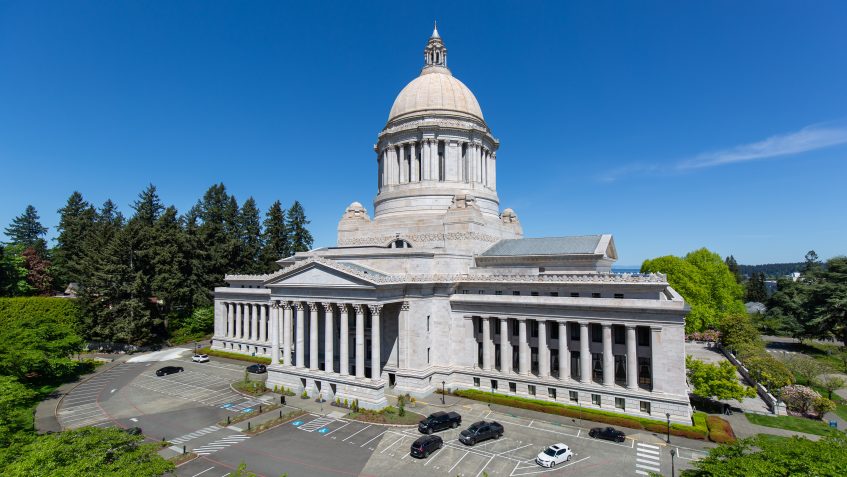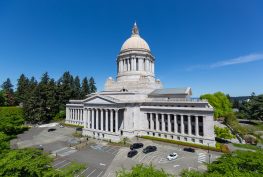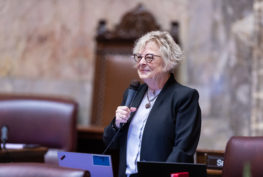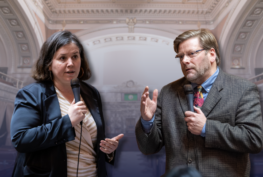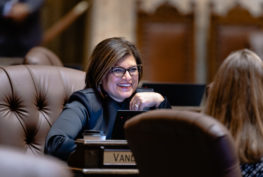The Senate on Tuesday unveiled the 2020 supplemental transportation budget. Normally a document used to make minor tweaks and updates to the statewide transportation needs, this version of the supplemental budget is introduced at a time when Washington’s transportation funding is at a crossroads.
This budget utilizes one-time balancing methods that provide a short-term fix, but does not attempt to address the larger, longer-term transportation budget crisis the Legislature must address next session.
“I’ve chaired the Transportation Committee for the last three years and been a member of the committee for nearly a decade. I can honestly say putting together this supplemental budget was one of the more challenging tasks of my tenure,” said Sen. Steve Hobbs (D-Lake Stevens). “The well has run dry in terms of transportation funding and this budget is an excellent representation of that.”
Gas tax revenues, the primary source of revenue that funds state transportation priorities, have steadily declined in recent years. The passage of Initiative 976 supplied another deep hit to transportation coffers by slashing passenger and light truck weight fees, passenger vehicle license fees and other revenue sources used for infrastructure improvements and multimodal services throughout Washington. I-976 will eliminate $453 million in state funds in the 2019-21 biennium and the loss will increase in the next biennium to $684.6 million.
Because of all these factors, this year’s supplemental budget has undergone something of a belt tightening. Budget writers sought creative solutions in how they deal with I-976 and a yet-to-come Supreme Court decision on its constitutionality.
The supplemental budget totals nearly $10.5 billion, including re-appropriations for delayed capital project activity, cost increases and reduced appropriations to account for the significant revenue reductions brought on by I-976.
However, I-976 is just the latest challenge to transportation revenue. Since the March 2019 transportation revenue forecast, transportation revenue projections are down $344 million (5.1 percent) in the 2019-21 biennium and $2.6 billion (7.4 percent) over the 10-year forecast horizon.
“Transportation revenue was drying up prior to the passage of I-976. The initiative took things from bad to devastating,” Hobbs said. “We had to get creative to make sure the state’s priorities were met. Moving money around like this is something that can only be done once. We are looking at a significant budget shortfall in January without new revenue.”
The budget assumes a general underrun of $402 million. That includes $200 million in highway capital, $26.8 million in public transportation capital, $66.5 million in local program capital in addition to other agency efficiencies. The budget includes “trigger” language that restores $121.7M in expenditure reductions should I-976 be overturned.
Addressing I-976 in this way provides the Governor with the ability to take all of the highway, local, rail, and public transportation projects off of his pause and delay lists.
“The Senate’s supplemental transportation budget takes a realistic approach to addressing our state’s transportation challenges in light of available revenue and the uncertainty over the fate of Initiative 976,” said Sen. Curtis King, R-Yakima and ranking Republican on the Senate Transportation Committee. “This is not the type of budget we would have liked to have been able to move forward but it is a budget that puts us on a prudent path that is needed at this time.”
Other areas of interest in the 2019-21 supplemental transportation budget include:
CULVERTS
$175 million in Connecting Washington funds is transferred to the 2019-21 biennium to fund fish passage barrier removal, bringing the total to $275 million this biennium to help fully fund the cost of complying with a Supreme Court injunction by 2030.
FERRIES
- $10.9 million increase for Seattle Terminal Replacement.
- $5.4 million for additional staffing costs, including $4.4 million for vessel crew overtime and $1 million for additional terminal staffing costs.
- $4.2 million for training including for crew qualification, break-in training for reassignments, evacuation slide training, and electronic navigation training.
- $4.3 million in savings due to the retirement of the MV Elwha ferry vessel, one of two vessels capable of sailing internationally. The retirement avoids $19 million in capital costs and reduces operating costs by $3 million per year. Washington State Ferries will move its only reserve boat, the Sealth, into regular service.
WASHINGTON STATE PATROL
- $975,000 to replace reduced Enhanced 911 revenue supporting emergency dispatch services in King County.
- $830,000 for additional information technology security efforts.
- $7.1 million in savings from updated projections of WSP trooper and non-field force staff vacancies.

